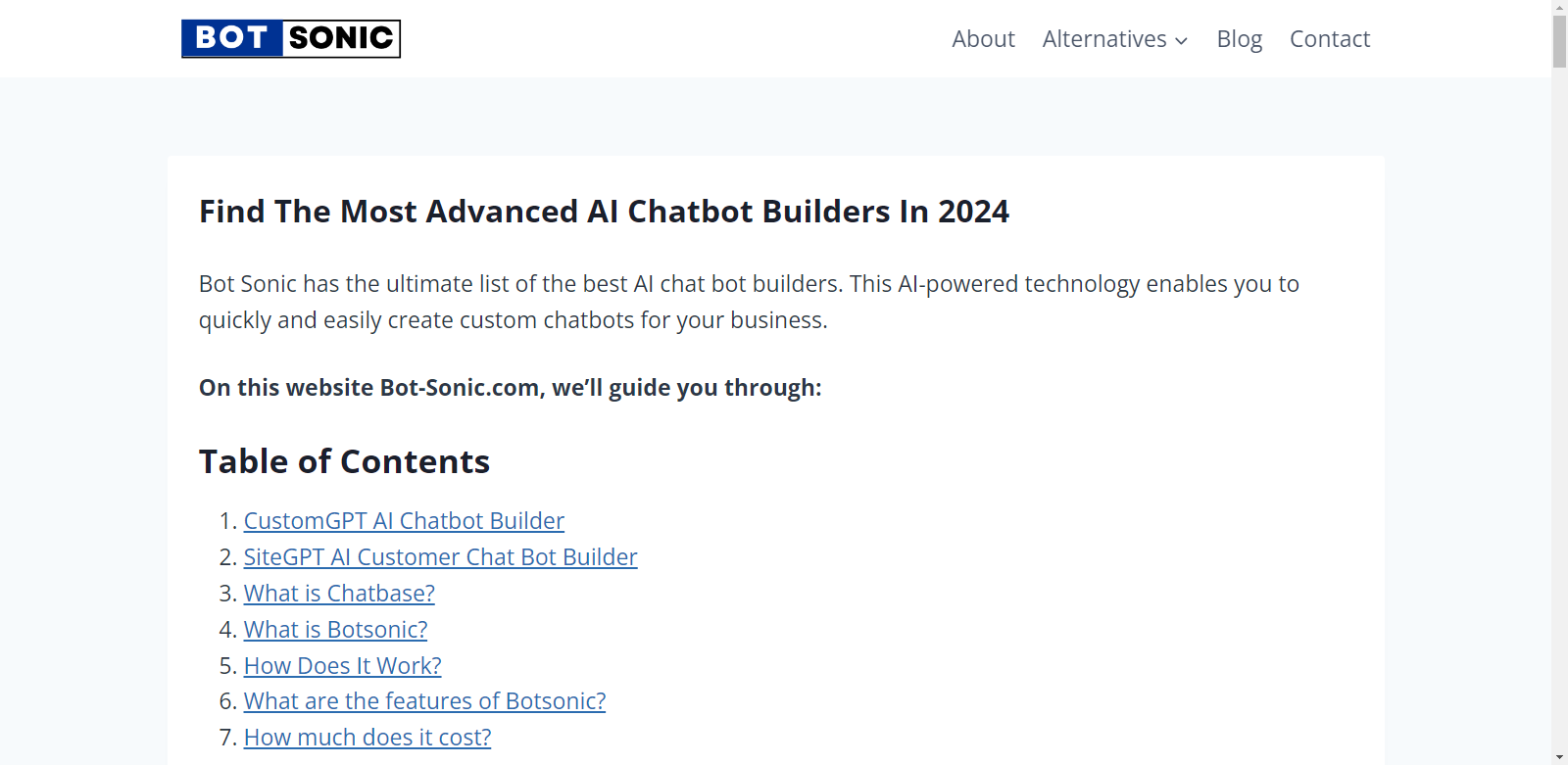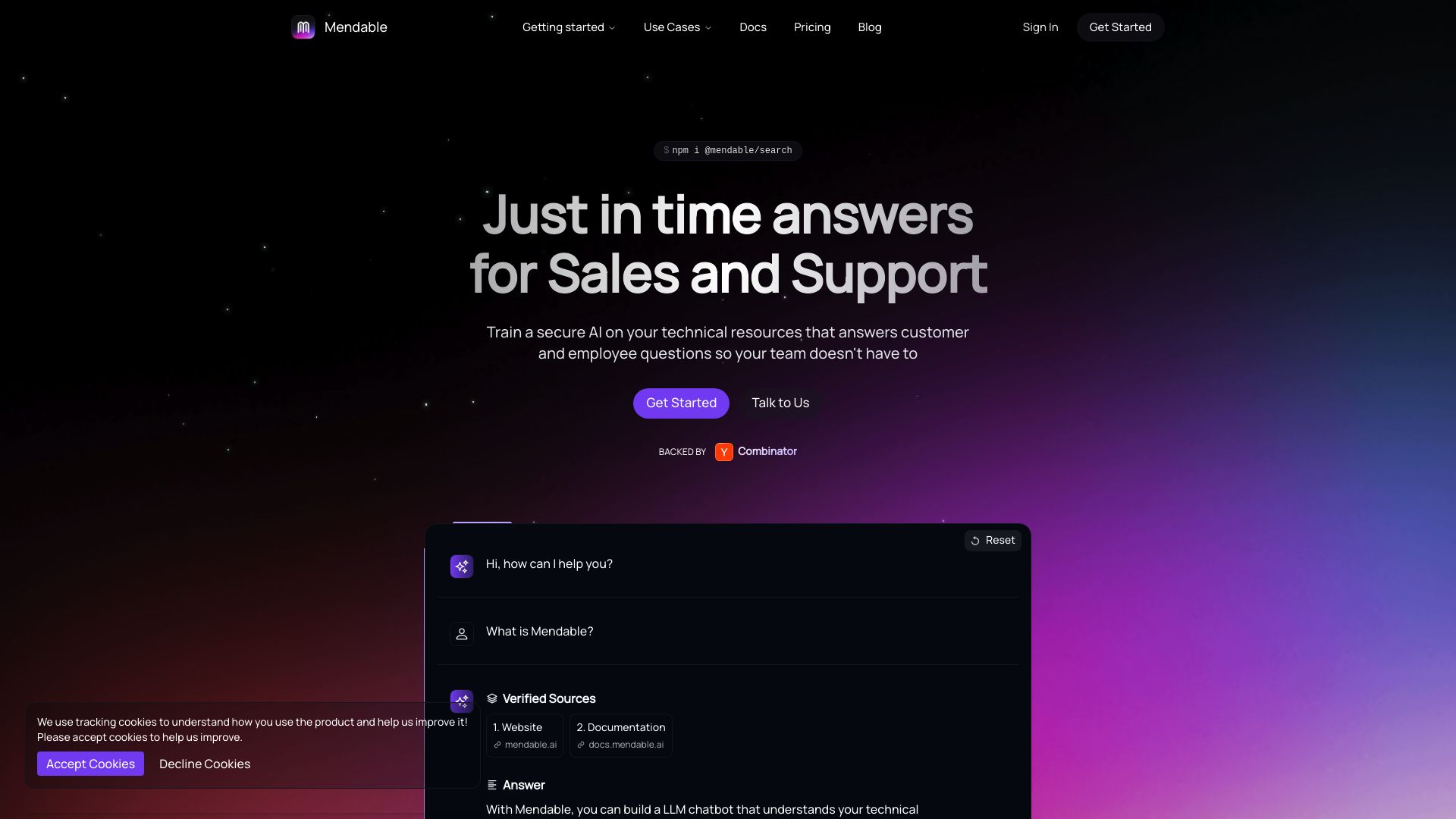Botsonic/Writesonic vs. Mendable: AI Customer Interaction Tools Compared
AI-powered customer interaction tools have become essential for businesses seeking to enhance support and engagement. This comparison explores Botsonic/Writesonic, Mendable, and SmythOS, three platforms revolutionizing how companies leverage AI for customer service. We’ll examine their key features, strengths, and limitations to help you choose the right solution for your needs.
Whether you’re a developer looking for advanced customization options, a business leader focused on scalability and security, or a non-technical user seeking user-friendly tools, this review provides insights to guide your decision-making process in selecting an AI platform that aligns with your goals and technical requirements.
Botsonic/Writesonic Overview
Botsonic/Writesonic empowers businesses to create intelligent chatbots without coding expertise. This no-code AI chatbot builder leverages GPT-4 and advanced natural language processing to deliver personalized customer interactions across industries.


Botsonic stands out with its rapid integration capabilities. Users can embed chatbots on their websites within minutes using a simple code snippet. The platform supports over ten languages, ensuring global reach and contextually accurate responses. Businesses can customize chatbot appearance, behavior, and responses to align with their brand identity.
Users can embed chatbots on their websites within minutes using a simple code snippet. The platform supports over ten languages, ensuring global reach and contextually accurate responses.
The tool shines in its ability to train on specific data. Users can upload various file formats and website links, enabling chatbots to provide highly personalized responses. This feature proves invaluable for businesses seeking to offer tailored customer support and engagement.
Botsonic integrates seamlessly with popular platforms like Salesforce, Google Docs, WhatsApp, and Telegram. This versatility allows businesses to extend AI-powered interactions across multiple channels. The platform’s analytics and conversation logs provide insights for continuous improvement of chatbot performance.
While Botsonic offers impressive features, it lacks some advanced capabilities. The platform doesn’t support multimodal inputs or provide a dedicated debug mode for developers. Additionally, there’s no mention of multi-agent collaboration or constrained alignment to ensure strict adherence to predefined guidelines.
Despite these limitations, Botsonic positions itself as a powerful tool for businesses aiming to enhance customer communication and engagement through AI. Its focus on accessibility and customization makes it a compelling option for organizations looking to leverage conversational AI without extensive technical resources.
Mendable Overview
Mendable empowers businesses with chat-powered search components that deliver accurate, contextual answers to customer queries based on existing documentation. The platform’s API and pre-built components for React, Vanilla JS, and Docusaurus enable seamless integration into various applications, enhancing user support and engagement.
Mendable’s suite of components includes the Search Bar, Floating Button, InPlace Component, and Chat Bubble, each designed for specific use cases. These tools allow businesses to implement AI-driven search capabilities without extensive coding knowledge. The platform’s strength lies in its ability to understand context, provide relevant responses, and maintain up-to-date information through auto-syncing from diverse data sources such as websites, GitHub, Notion, and Zendesk.
Customization stands out as a key feature of Mendable. Users can tailor AI responses using prompt templates and dynamic variables, ensuring that answers align closely with specific business needs and tone. The platform’s metadata filtering capabilities offer precise control over information sources, further enhancing the relevance of generated responses.
Mendable empowers businesses with chat-powered search components that deliver accurate, contextual answers to customer queries based on existing documentation.


For developers seeking advanced functionality, Mendable provides robust API and SDK options, including a Python SDK. These tools enable extensive customization and integration possibilities, supporting complex use cases and automation needs. The platform’s Product Copilots feature takes this a step further by offering context-aware answers tailored to specific application data, significantly enhancing user support within individual applications.
Mendable’s vision focuses on streamlining information delivery through AI-powered search capabilities. By integrating seamlessly with popular platforms like Slack, Discord, and WordPress, Mendable aims to enhance user support across diverse environments. The platform’s commitment to continuous improvement of components, APIs, and support tools demonstrates its dedication to meeting evolving user needs in the dynamic landscape of AI-driven information retrieval and customer support.
Feature Comparison
Botsonic/Writesonic and Mendable offer distinct approaches to AI-powered customer interactions. Botsonic excels in rapid chatbot deployment, supporting multiple languages and integrating with popular platforms. It enables quick customization of chatbot appearance and behavior to align with brand identity. Mendable, on the other hand, focuses on enhancing search capabilities within existing documentation, providing components that deliver contextual answers based on company data.
While both platforms aim to improve customer support, they differ significantly in their core components. Botsonic lacks advanced debugging tools and multi-agent collaboration features, which could limit its effectiveness for complex implementations. Mendable’s component-based approach offers more flexibility for developers but may require more technical expertise to fully utilize. Neither platform explicitly mentions constrained alignment capabilities, potentially leaving gaps in ensuring strict adherence to predefined guidelines.
Security features also vary between the two. Botsonic provides data encryption and IP whitelisting but doesn’t offer detailed information on its security standards. Mendable’s documentation doesn’t highlight specific security measures, which could be a concern for businesses handling sensitive information. Both platforms support API integrations, but Mendable’s extensive SDK options and Product Copilots feature may give it an edge for developers seeking deeper customization and context-aware functionalities within applications.
Feature Comparison Table
| Botsonic/Writesonic | Mendable | SmythOS | |
|---|---|---|---|
| CORE FEATURES | |||
| Hosted Agents (Dev, Production) | ✅ | ❌ | ✅ |
| Environments (Dev, Production) | ✅ | ❌ | ✅ |
| Visual Builder | ❌ | ❌ | ✅ |
| No-Code Options | ✅ | ❌ | ✅ |
| Autonomous Agents | ✅ | ❌ | ✅ |
| Debug Tools | ❌ | ❌ | ✅ |
| Multimodal | ❌ | ❌ | ✅ |
| Multi-Agent Collaboration | ❌ | ❌ | ✅ |
| Work as Team | ❌ | ❌ | ✅ |
| Bulk Work | ❌ | ✅ | ✅ |
| Agent Work Scheduler | ❌ | ❌ | ✅ |
| SECURITY | |||
| Constrained Alignment | ❌ | ❌ | ✅ |
| Data Encryption | ❌ | ✅ | ✅ |
| OAuth | ❌ | ✅ | ✅ |
| IP Control | ✅ | ❌ | ✅ |
| COMPONENTS | |||
| Foundation AIs | ✅ | ❌ | ✅ |
| Huggingface AIs | ❌ | ❌ | ✅ |
| Zapier APIs | ❌ | ❌ | ✅ |
| Classifiers | ❌ | ❌ | ✅ |
| Logic | ✅ | ❌ | ✅ |
| Data Lakes | ❌ | ❌ | ✅ |
| DEPLOYMENT OPTIONS (EMBODIMENTS) | |||
| Deploy as Webhook | ❌ | ❌ | ✅ |
| Staging Domains | ❌ | ❌ | ✅ |
| Production Domains | ✅ | ❌ | ✅ |
| API Authentication (OAuth + Key) | ❌ | ✅ | ✅ |
| Deploy as Scheduled Agent | ❌ | ❌ | ✅ |
| Deploy as GPT | ✅ | ❌ | ✅ |
| DATA LAKE SUPPORT | |||
| Hosted Vector Database | ❌ | ❌ | ✅ |
| Sitemap Crawler | ✅ | ❌ | ✅ |
| YouTube Transcript Crawler | ✅ | ❌ | ✅ |
| URL Crawler | ✅ | ❌ | ✅ |
Best Alternative to Botsonic/Writesonic and Mendable
SmythOS stands out as the superior alternative to Botsonic/Writesonic and Mendable, offering a comprehensive AI agent development platform that combines ease of use with powerful features. Our drag-and-drop interface empowers users to create sophisticated AI agents without extensive coding knowledge, making advanced AI accessible to a broader audience.
Unlike Botsonic/Writesonic and Mendable, SmythOS provides a versatile ecosystem for building, deploying, and managing AI agents across various use cases. We offer robust multi-agent collaboration capabilities, enabling teams of AI agents to work together on complex tasks — a feature notably absent in both Botsonic and Mendable.
SmythOS excels in its extensive integration options, supporting a wide array of AI models, APIs, and tools. This flexibility allows users to leverage cutting-edge AI technologies…
SmythOS excels in its extensive integration options, supporting a wide array of AI models, APIs, and tools. This flexibility allows users to leverage cutting-edge AI technologies and seamlessly incorporate them into existing workflows. Our platform also prioritizes security and scalability, with features like data encryption and OAuth authentication that address enterprise-level concerns often overlooked by competitors.
Perhaps most importantly, SmythOS offers unparalleled customization and debugging tools. Our visual builder and no-code options make it easy to create and modify AI agents, while our comprehensive debugging features allow for fine-tuning and optimization. This level of control and transparency is crucial for developing reliable, high-performance AI solutions — an area where both Botsonic/Writesonic and Mendable fall short.
By choosing SmythOS, users gain access to a future-proof platform that continually evolves to meet the changing demands of AI development. Our commitment to user-friendly design, ethical AI practices, and scalable solutions positions SmythOS as the ideal choice for businesses and developers looking to harness the full potential of AI technology.
Conclusion
Botsonic/Writesonic and Mendable offer distinct AI-powered solutions for customer interactions and information retrieval. Botsonic excels in rapid chatbot deployment with multilingual support, while Mendable focuses on enhancing search capabilities within existing documentation. Both platforms provide value, but each has limitations in advanced features like debugging tools or multi-agent collaboration.
SmythOS emerges as the superior choice, offering a comprehensive suite of AI agent creation and deployment tools. Its drag-and-drop interface, extensive integration ecosystem, and support for multiple AI models make it accessible to both technical and non-technical users. SmythOS’s ability to create multi-agent systems, deploy across various platforms, and provide versatile solutions for complex tasks sets it apart from competitors.
The platform’s focus on scalability, security, and customization addresses the needs of businesses across industries. With features like constrained alignment, data encryption, and support for various deployment options, SmythOS provides a robust foundation for building sophisticated AI solutions.
For those seeking to harness the full potential of AI in their operations, we recommend exploring SmythOS’s capabilities. Create a free SmythOS account to experience the platform’s power firsthand, or dive into our comprehensive documentation to learn more about how SmythOS can transform your AI development process.
Last updated:
Disclaimer: The information presented in this article is for general informational purposes only and is provided as is. While we strive to keep the content up-to-date and accurate, we make no representations or warranties of any kind, express or implied, about the completeness, accuracy, reliability, suitability, or availability of the information contained in this article.
Any reliance you place on such information is strictly at your own risk. We reserve the right to make additions, deletions, or modifications to the contents of this article at any time without prior notice.
In no event will we be liable for any loss or damage including without limitation, indirect or consequential loss or damage, or any loss or damage whatsoever arising from loss of data, profits, or any other loss not specified herein arising out of, or in connection with, the use of this article.
Despite our best efforts, this article may contain oversights, errors, or omissions. If you notice any inaccuracies or have concerns about the content, please report them through our content feedback form. Your input helps us maintain the quality and reliability of our information.
